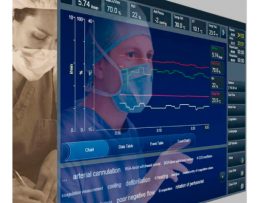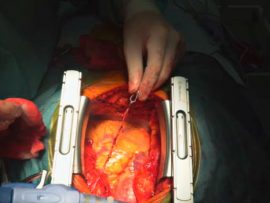Abstract Modern day cardiac surgery evolved upon the advent of cardiopulmonary bypass machines (CPB) in the 1950s. Following this development, cardiac surgery in recent years has improved significantly. Despite such..
Read MoreAbstract A high neutrophil-lymphocyte ratio (N/L ratio) was associated with the development of acute kidney injury (AKI) in patients with severe sepsis. We sought to investigate the association between the..
Read MoreAbstract Introduction: Propofol has been suggested as a useful adjunct to cardiopulmonary bypass (CPB) because of its potential protective effect on the heart mediated by a decrease in ischemia-reperfusion injury..
Read MoreAbstract A best evidence topic was written according to a structured protocol. The clinical question investigated was: is low serum albumin associated with postoperative complications in patients undergoing cardiac surgery?..
Read MoreAbstract Despite the growing body of evidence evaluating the efficacy of vasoactive agents in the management of hemodynamic instability and circulatory shock, it appears no agent is superior. This is..
Read MoreAbstract Introduction Saline-based and hydroxyethyl starch solutions are associated with increased risk of renal dysfunction. In the present study, we tested the hypothesis that balanced solutions and a limited volume..
Read MoreAbstract Intraoperative aortic dissection is a rare but fatal complication of open heart surgery. By recognizing the population at risk and by using a gentle operative technique in such patients,..
Read MoreAbstract Hypovolemia, anemia and hypoxemia may cause critical deterioration in the oxygen delivery (DO2). Their early detection followed by a prompt and appropriate intervention is a cornerstone in the care..
Read MoreAbstract This editorial marks my first year as Editor-in-Chief (EIC) of the Canadian Journal of Anesthesia, and although it appears here in our December issue, it actually went “to press” in..
Read MoreAbstract Introduction Microvascular reactivity is decreased in patients with septic shock; this is associated with worse clinical outcomes. The objectives of the present study were to investigate microvascular reactivity in..
Read MoreAbstract Objective The present study is to describe the clinical impact of S100 and S100β for the evaluation of cerebral damage in cardiac surgery with or without the use of..
Read MoreAbstract Background Each year in the UK, ≈3000 children undergo major cardiac surgery requiring cardiopulmonary bypass. Approximately 40 % of these experience excessive bleeding necessitating red cell transfusion or treatment with..
Read MoreAbstract Objective To share our experience highlighting the additional use of cardiopulmonary bypass (CPB) in cases other than the conventional ischemic, congenital and valvular heart diseases. Methodology All patients undergoing..
Read MoreAbstract Introduction: The cardiopulmonary bypass may have multiple systemic effects on the body organs as liver. This prospective study was planned to explore further the incidence and significance of this..
Read MoreAbstract Introduction In a recent randomized controlled trial our group has demonstrated in 102 patients that late post-conditioning with sevoflurane performed in the intensive care unit after surgery involving extracorporeal..
Read MoreAbstract Background Extracorporeal cardiopulmonary resuscitation (ECPR) is being used increasingly in the emergency and critical care field in Japan. A major complication of ECPR is bleeding; however, the optimal initial..
Read MoreAbstract Extracorporeal membrane oxygenation (ECMO) can be a lifesaving therapy in patients with refractory severe respiratory failure or cardiac failure. Severe acute respiratory distress syndrome (ARDS) still has a high-mortality..
Read MoreAbstract The primary focus of research into the pathophysiology of the acute respiratory distress syndrome (ARDS) has been on the interaction between the lung, underlying causes of ARDS, and the..
Read MoreAbstract Background The Standards for Quality Improvement Reporting Excellence (SQUIRE) Guidelines were published in 2008 to increase the completeness, precision and accuracy of published reports of systematic efforts to improve..
Read MoreAbstract Background: The aim of this retrospective study is to determine the correlation between preoperative CRP levels and the early renal dysfunction after cardiac surgery. Methods: From January 2012 to..
Read MoreAbstract In order to assess mechanisms underlying inflammatory activation during extracorporeal circulation (ECC), several small animal models of ECC have been proposed recently. The majority of them are based on..
Read MoreAbstract Introduction Central venous saturation (ScvO2) monitoring has been suggested to address the issue of adequate cardiocirculatory function in the context of cardiac surgery. The aim of this study was..
Read MoreAbstract Background Postoperative bleeding after heart operations is still a common finding, leading to allogeneic blood products transfusion. Fibrinogen and coagulation factors deficiency are possible determinants of bleeding. The experimental..
Read MoreAbstract Introduction While non-invasive ventilation aimed at avoiding intubation has become the modality of choice to treat mild to moderate acute respiratory acidosis, many severely acidotic patients (pH <7.20) still..
Read MoreAbstract Peripheral extracorporeal membrane oxygenation (ECMO) is associated with a not negligible rate of vascular morbidity. Most vascular complications are related to limb ischaemia mainly due to insufficient limb perfusion..
Read MoreAbstract A best evidence topic in cardiac surgery was written according to a structured protocol. The question addressed was ‘Is it possible to predict the risk of ischaemic bowel after..
Read MoreAbstract A best evidence topic in cardiac surgery was written according to a structured protocol. The question addressed was whether patients with haematological malignancy (HM) who need cardiopulmonary bypass (CPB)..
Read MoreAbstract Background Thousands of air bubbles enter the cerebral circulation during cardiac surgery, but whether high numbers of bubbles explain post-operative cognitive decline is currently controversial. This study estimates the..
Read MoreAbstract Introduction. The venovenous/portal venous (VVP) bypass technique has generally become obsolete in liver transplantation (LT) today. We evaluated our experience with 163 consecutive LTs that used a VVP bypass. Patients..
Read More


























